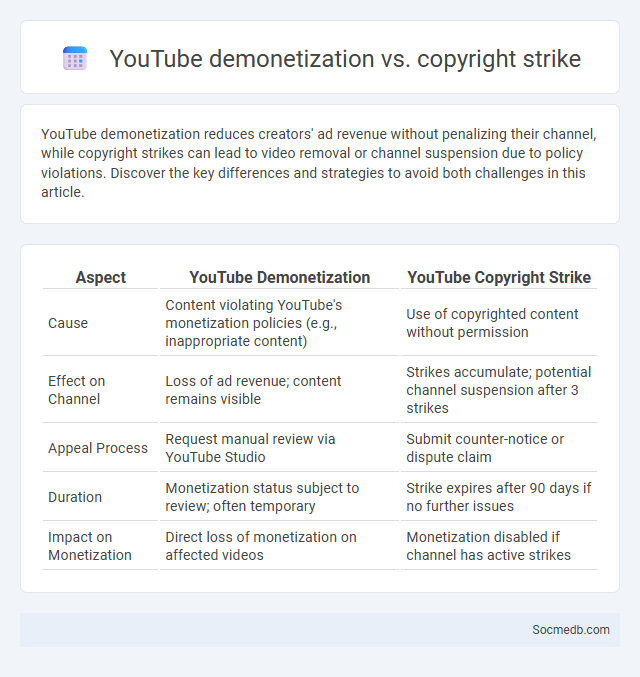
Photo illustration: YouTube demonetization vs copyright strike
YouTube demonetization reduces creators' ad revenue without penalizing their channel, while copyright strikes can lead to video removal or channel suspension due to policy violations. Discover the key differences and strategies to avoid both challenges in this article.
Table of Comparison
| Aspect | YouTube Demonetization | YouTube Copyright Strike |
|---|---|---|
| Cause | Content violating YouTube's monetization policies (e.g., inappropriate content) | Use of copyrighted content without permission |
| Effect on Channel | Loss of ad revenue; content remains visible | Strikes accumulate; potential channel suspension after 3 strikes |
| Appeal Process | Request manual review via YouTube Studio | Submit counter-notice or dispute claim |
| Duration | Monetization status subject to review; often temporary | Strike expires after 90 days if no further issues |
| Impact on Monetization | Direct loss of monetization on affected videos | Monetization disabled if channel has active strikes |
Understanding YouTube Demonetization
YouTube demonetization occurs when your videos no longer generate revenue due to violations of YouTube's advertiser-friendly content guidelines or copyright policies. Understanding key factors such as content sensitivity, community guidelines adherence, and copyright claims helps you maintain monetization status. Monitoring your YouTube analytics and staying updated on policy changes ensures continued ad revenue and channel growth.
What Is a YouTube Copyright Strike?
A YouTube copyright strike occurs when a content owner submits a complaint against a video that allegedly infringes on their copyrighted material, leading to restrictions or removal of the video. Each strike impacts the channel's ability to upload content, participate in live streams, or monetize videos until the strike expires, typically after 90 days. Accumulating three strikes may result in channel termination, emphasizing the importance of adhering to copyright guidelines on the platform.
Demonetization vs Copyright Strikes: Key Differences
Demonetization occurs when a platform disables revenue generation on Your content, usually due to policy violations or advertiser concerns, while copyright strikes are official warnings triggered by unauthorized use of copyrighted material. Demonetization affects Your earning potential without necessarily removing the content, whereas copyright strikes can lead to content removal or account suspension. Understanding these distinctions helps creators navigate platform rules and protect their channel's monetization status.
How YouTube’s Demonetization Policy Works
YouTube's demonetization policy removes or restricts ads on videos that violate its advertiser-friendly guidelines, affecting your revenue generation. Videos containing sensitive content, such as violence, inappropriate language, or controversial topics, are more likely to be demonetized. Creators can appeal demonetization decisions to restore ad eligibility and maintain their channel's monetization status.
The Impact of Copyright Strikes on Creators
Copyright strikes on social media platforms significantly affect creators by restricting their content visibility and risking account suspension, which directly impacts their audience reach and revenue streams. You must understand how repeated copyright violations can lead to permanent bans, making it essential to navigate content usage carefully and respect intellectual property laws. Protecting your creative work and ensuring compliance with platform policies helps maintain your online presence and fosters a sustainable creator career.
Common Reasons for YouTube Demonetization
YouTube demonetization often results from violations of platform policies such as inappropriate content, copyright infringement, and community guideline breaches. Videos containing violence, hate speech, or misleading information frequently trigger demonetization to maintain advertiser-friendly standards. Consistent adherence to YouTube's monetization policies is crucial for creators to sustain revenue and avoid account penalties.
How to Avoid Copyright Strikes on YouTube
To avoid copyright strikes on YouTube, always use original content or obtain explicit permission from copyright holders before uploading videos. Utilize YouTube's Audio Library for royalty-free music and employ content ID tools to check for copyrighted materials in your uploads. Clearly attribute any third-party content and consider fair use policies when incorporating copyrighted work in transformative or educational contexts.
Recovering from Demonetization: Best Practices
Recovering from demonetization on social media requires diversifying revenue streams by exploring affiliate marketing, sponsored content, and merchandise sales. Creating high-quality, engaging content consistently helps rebuild audience trust and maintain platform algorithms favorability. Utilizing alternative platforms and building a strong email list also secures income stability beyond traditional ad revenues.
Navigating YouTube’s Content Monetization Rules
YouTube's content monetization rules require creators to comply with strict guidelines, including adherence to community standards and eligibility criteria such as 1,000 subscribers and 4,000 watch hours within the past 12 months. Videos must avoid prohibited content like hate speech, misinformation, and copyright violations to qualify for the YouTube Partner Program and ads revenue. Understanding these policies is crucial for creators aiming to maximize earnings while maintaining channel integrity.
Future Trends: Copyright and Demonetization on YouTube
Future trends in social media indicate stricter enforcement of copyright laws on YouTube, with AI-powered detection systems enhancing content monitoring to prevent unauthorized use. Demonetization policies are expected to evolve, focusing on advertiser-friendly content guidelines and combating misinformation to protect platform integrity and creator revenue. These shifts will require creators to prioritize original content creation and compliance to sustain monetization opportunities.
 socmedb.com
socmedb.com